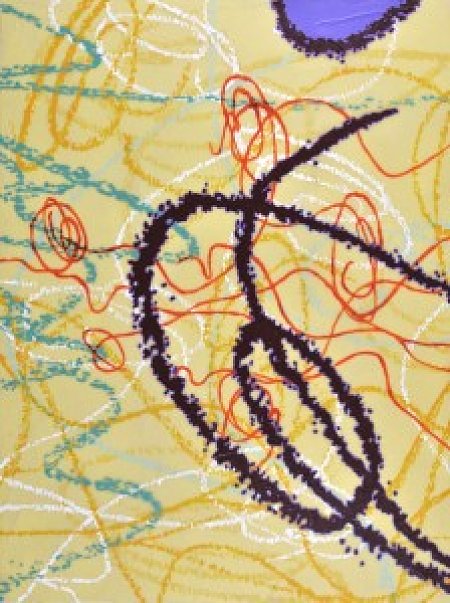
Numbers
Lately I have been suffering from this well-known condition. But there is a slight difference: in my situation, if I write, I continue living, because I have nothing left on this train except my writing abilities, and my faith in my talent keeps me alive.
VIII.
Hours pass, and no words come from me. Kilometers pass outside the train’s window, and I cannot come up with any phrases. Days pass, and I still have not shaped a story idea in my mind. One person died on the train, but they quickly got rid of her; she was very old. There was no way to bury her and no way to continue going on with the dead body, so they just threw her out of the train, so fast that I didn’t even have time to take a look…
My neighbor, the woman who was begging me for paper, became my good friend here. She does not ask me for paper anymore, and I don’t frown when she attends to her bodily needs right in the crowded passenger carriage; everybody seems to get used to such things. This woman told me that the elderly train “passenger” had a weak heart, and it appears that hours on the train weakened her even more, and she passed away.
This elderly woman was very quiet, so I never paid any attention to her; there were no special details either in her clothes or her appearance, so I never got inspired to include her in my future fiction… I’m thinking of this all the time now: there are so many of us here on the train; we have lost our individuality; we have become a collective body: hungry, unkempt, unashamed of our bodies, begging for crumbs–there is nothing individual anymore, but art calls for an individual detail about a person… I tried to concentrate on a woman or man and describe him or her, but people become so indistinguishable here, all starving with bad skin and a bad smell, that there seems to be no distinction between them… I assume that, inside, everybody is different, but how can I know that? People here became distrustful, and each has his problems and worries, so everybody is now becoming more silent and just keeps to himself.
That’s why in my would-be short story I should stick to Olga. Olga was an individual before she ended her life. She was a niece of famous publishers, and she tried to remember pages in her children’s books; she was unique, and now I suspect that this is why her only option was suicide. With fascist racial laws and the negative attitude toward Jews encouraged by Nazis, she knew that she was not considered an individual anymore… She was considered a part of an alien population… She had no face and no history, she was only hated as a general body, as a concept, the concept of the “greedy Jew.” Her individualistic act of suicide was a protest against losing her own face.
And for me not to lose my own face and my own individuality, I have to write. I have to write, but I can’t force myself. I have gotten crushed in this train, they try to make me nothing, and a nothing obviously cannot have its own thoughts. But it’s not only this, it’s also that I have become weak, and sometimes I only think of food, my desire for food, any kind of food, a hot potato or hot milk, something I considered too simple during my “other” life before this train.
The people on the train devised a game: they talk about foods their mothers cooked for them in their childhood, and this turns everybody into a hysterical creature. After discussing food, nobody can sleep anymore, and everybody lies with their eyes open, and it is as though those hot potatoes and hot milk float in front of them… But for me, maybe, it’s only an excuse… It’s been days since I last took a pencil in my hands, and I feel that I’m losing my individuality, my only quality that made my life worth living, and I am starting to be afraid that I’m not going to become a writer, because I’m just not strong enough and don’t have enough drive…
IX.
Today, finally, the train stopped. We were in the middle of the same nondescript land that surrounded us before, but now this nondescript land was full of meaning. Before it was nothing, a nameless piece of earth, and now it is a place where our future is waiting for us. People started laughing and smiling. We got out of the train and started walking around stretching our limbs. Hot water and even soup was provided. We were screened, fed, and led to barracks. These barracks all looked the same, without any distinguishing details: just wooden homes with some benches and some windows and basic doors, but still it was better than trains. They told us that tomorrow we are going to be washed and groomed, our hair will be cut, and doctors will determine who is going to get which jobs.
